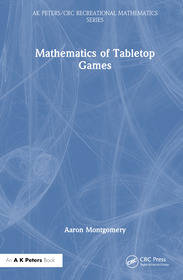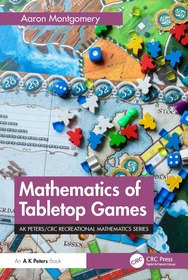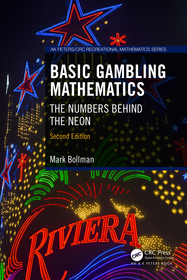
Mathematics of Tabletop Games
Sorozatcím: AK Peters/CRC Recreational Mathematics Series;
-
20% KEDVEZMÉNY?
- A kedvezmény csak az 'Értesítés a kedvenc témákról' hírlevelünk címzettjeinek rendeléseire érvényes.
- Kiadói listaár GBP 81.99
-
39 170 Ft (37 305 Ft + 5% áfa)
Az ár azért becsült, mert a rendelés pillanatában nem lehet pontosan tudni, hogy a beérkezéskor milyen lesz a forint árfolyama az adott termék eredeti devizájához képest. Ha a forint romlana, kissé többet, ha javulna, kissé kevesebbet kell majd fizetnie.
- Kedvezmény(ek) 20% (cc. 7 834 Ft off)
- Kedvezményes ár 31 336 Ft (29 844 Ft + 5% áfa)
Iratkozzon fel most és részesüljön kedvezőbb árainkból!
Feliratkozom
39 170 Ft

Beszerezhetőség
Becsült beszerzési idő: A Prosperónál jelenleg nincsen raktáron, de a kiadónál igen. Beszerzés kb. 3-5 hét..
A Prosperónál jelenleg nincsen raktáron.
Why don't you give exact delivery time?
A beszerzés időigényét az eddigi tapasztalatokra alapozva adjuk meg. Azért becsült, mert a terméket külföldről hozzuk be, így a kiadó kiszolgálásának pillanatnyi gyorsaságától is függ. A megadottnál gyorsabb és lassabb szállítás is elképzelhető, de mindent megteszünk, hogy Ön a lehető leghamarabb jusson hozzá a termékhez.
A termék adatai:
- Kiadás sorszáma 1
- Kiadó A K Peters
- Megjelenés dátuma 2024. július 24.
- ISBN 9781032468518
- Kötéstípus Keménykötés
- Terjedelem208 oldal
- Méret 234x156 mm
- Súly 453 g
- Nyelv angol
- Illusztrációk 106 Illustrations, black & white; 23 Halftones, black & white; 83 Line drawings, black & white; 15 Tables, color 581
Kategóriák
Rövid leírás:
This book provides a bridge between mathematics and hobby tabletop gaming. Readers interested in either mathematics or tabletop games will find this book an engaging way to begin exploring the other topic or the connection between the topics.
TöbbHosszú leírás:
Mathematics of Tabletop Games provides a bridge between mathematics and hobby tabletop gaming. Instead of focusing on games mathematicians play, such as nim and chomp, this book starts with the tabletop games played by avid gamers and hopes to address the question: which field of mathematics concerns itself with this situation?
Readers interested in either mathematics or tabletop games will find this book an engaging way to begin exploring the other topic or the connection between the topics.
Features
- Presents an entry-level exposition of interesting mathematical concepts that are not commonly taught outside of upper-level mathematics courses
- Acts as a resource for mathematics instructors who wish to provide new examples of standard mathematical concepts
- Features material that may help game designers and developers make design decisions about game mechanisms
- Provides working Python code that can be used to solve common questions about games
- Covers a broad range of mathematical topics that could be used as survey material for undergraduates curious about mathematics.
“A seminal and groundbreaking study that will of be particular interest to gamers wanting an introduction to the mathematics behind their gaming pastime pursuits, "Mathematics of Tabletop Games" by mathematician and educator Aaron Montgomery is especially and unreservedly recommended for personal, professional, and college/university library Recreational Mathematics collections.”
—Midwest Book Review
“This book undoubtedly fits into recreational mathematics, as it combines gaming with topics such as combinatorics, graph theory, group theory, logic, probability, and number theory. The mathematics presented is straightforward and accessible to undergraduates. Besides learning about games that have a mathematical flair, I found the main draw of the book to be that it offers unique examples to use in courses that cover any of the aforementioned topics. A motivated undergraduate could use this for an independent study or even spark a project exploring the mathematics behind their favorite games.”
—Notices of the American Mathematical Society
“Don’t be intimidated: the book is surprisingly accessible. Aaron Montgomery guides the reader with clarity, starting from the basics and never taking anything for granted, nor requiring prior knowledge.
The game chosen as an example in each case is introduced just enough to follow the references, and every mathematical concept is explained patiently, step by step. Credit also goes to smart editorial choices: short paragraphs, summary diagrams, and tables that condense key points, making the reading pleasant and straightforward.”
—Volpe Giocosa, boardgamegeek.com
Több
Tartalomjegyzék:
1. Combinatorics. 2. Geometry. 3. Group Theory. 4. Graph Theory. 5. Probability. 6. Game Theory. 7. Auctions. 8. Logic. 9. Number Theory.
Több





